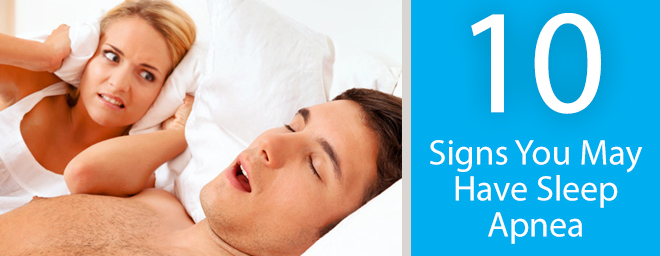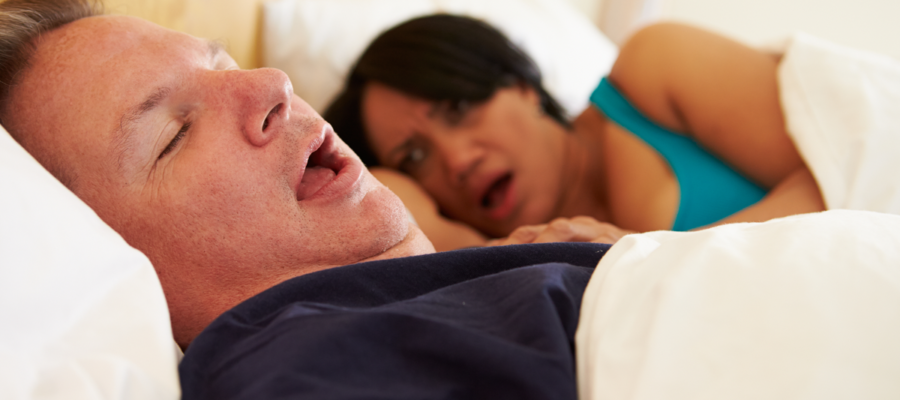The Center for Disease Control is calling insufficient sleep a public health epidemic. A huge portion of this mass sleeplessness can be blamed on society – too many television stations, too many smartphones, too many late nights in front of the blue glow of a computer screen. You could call it technology-induced insomnia. However, you can also blame this epidemic on evolution, because many sleepless nights are being caused by a disorder known as sleep apnea, which is far from rare and is oftentimes brushed off as insomnia. Over 20 million Americans suffer from the disorder and almost 90% of people who have sleep apnea are undiagnosed. Did you know that people with sleep apnea are twice as likely to crash and die in a car accident? People with sleep apnea also have a 30% higher risk of dying from a heart attack. Obstructive sleep apnea, which is the most common form of sleep apnea, sets off a chain reaction of health conditions that include cardiovascular disease, stroke, diabetes, depression, and high blood pressure – the list goes on and on. And while people who are obese might have a higher chance of being diagnosed with the disorder, sleep apnea spares no specific type of person, so it is important to pay attention to a series of different signs to know if you should seek help. Here are ten signs that you might have sleep apnea.

1. Excessive and persistent snoring.
Does that person next to you sound like a lawnmower when they sleep? Does your snoring wake you up? Do your neighbors have to tap on your window, because your snoring is just too loud? Excessive snoring – at intolerable decibel levels – is usually the first sign of sleep apnea. Snoring is a result of an obstruction in the respiratory tract, which is basically what sleep apnea is, so the first question doctors will ask is whether you snore or not. But doctors also stress that just because you snore, it doesn’t mean you definitely have sleep apnea, because a lot of people snore – and a lot of people snore loudly. When it comes down to it, excessive, loud snoring is simply an alarm that you should at least see a doctor, because you could potentially have sleep apnea. Loud snoring alone – with or without sleep apnea – can increase the risk of stroke or heart attack.
2. Obesity.
There is no doubt about it – obesity rates are at an all time high. About 65% of Americans are overweight or obese. Why are we getting so fat? Well, it mainly has to do with our luxuriously sedentary lifestyles of eating Ho Hos and watching reality TV until we can’t fit anymore food in our mouths. A hundred years ago, we were more active laborers, working in fields or factories from sun up until sundown, and were eating much healthier, well rounded meals. Did someone say Supersize Me? – Check it out. Today, the American Dream is more about McRib sandwiches and Big Gulps. This lifestyle is wreaking havoc on our waist lines and research shows that it is causing a huge rise in sleep apnea. Researchers think that the more heavy someone is, the bigger his or her neck is, which could exacerbate or increase the risk of developing sleep apnea. Researchers also stress that you don’t need to be obese to have sleep apnea, and vice versa, but obesity is a good indicator.
3. Always feeling exhausted.
Do you always feel tired – no matter how long you spend in bed? Is it hard to keep your eyes open while driving, reading or listen to people blabber on about stuff you don’t care about, like the new iPhone operating system or the season finale of Glee? Chronic fatigue is one of the most common signs of sleep apnea. If morning after morning you feel like you just can’t seem to get a restful night’s worth of deep sleep, chances are that you have sleep apnea. You might not know it, but you could be having pauses in your breathing multiple times a night, which can effect your ability to enter a true restful sleep state. Basically, all you are really doing is lightly cat napping, when you should be getting a full 7 to 8 hours worth of sleep. If you notice that you are feeling exhausted more than usual, be sure to make an appointment with your doctor – the reason why you can’t stay awake when people are talking is not because they are boring, but because you might have sleep apnea.
4. Night sweats.
Have you ever woken up, dripping in sweat and felt like you just ran a marathon? It could be that you had a nightmare about Apple running out of the new gold iPhone or it could be something more serious, like sleep apnea. There are a number of reasons why sleep apnea causes night sweats. One of the main reasons is that your body goes into hyperdrive each time you stop breathing, or have what is known as an apnea, because essentially your body is fighting for air. Another reason why sleep apnea causes night sweats is because this lack of breath and oxygen causes your body to enter a fight or flight panic mode. So, if you find yourself waking up, drenched in your own sweat, you could have sleep apnea.
5. Continual nighttime awakenings.
Some people with obstructive sleep have hundreds of cessations in breath throughout the night – sometimes these pauses in breathing can last up to 40 seconds. Every time this happens, your body basically wakes you up to say, “Yo, dude, you’re choking, wake up.” These continual nighttime awakenings can cause severe fatigue the next day. They can also result in a really fretful night’s sleep. Out of all the symptoms of sleep apnea, this is up there with the worst of them, because it literally robs you of something you so desperately need: rest. The worst part is that many people have no idea that they are choking in their sleep, because like a bad dream, the memory simply fades away. Usually, the only way a person knows if this this is happening is if he or she undergoes a sleep test at a laboratory or healthcare facility.
6. Frequent nighttime urination.
You know that feeling of really having to pee, but you are all snuggled up in bed and don’t want to move? It’s almost as worse as having to get out of the shower on a cold day. However, frequent nighttime urination, or nocturia, might be a sign that you are suffering from sleep apnea. Most people can get through a whole 7 to 8 hours without having to urinate, but people with sleep apnea could be waking up five to six times a night to alleviate themselves. On top of all the other sleep disturbances that sleep apnea causes, frequent urination is another one to add to the list. Researchers believe that this frequent urination has to do with a disruption in the circadian rhythm, which regulates sleep patterns. Basically, the more often you wake up grasping for breath, the more times you have to urinate. It’s a vicious cycle.
7. Morning headaches.
Headaches are the worst, aren’t they? However, if you start waking up with a headache on a regular basis and wonder if something is wrong, it is probably a sign that you might be suffering from sleep apnea. Usually, these morning headaches are the worst kind – deep, painful and throbbing. If you suffer from sleep apnea, the reason why you are getting these headaches is because there is an excess amount of carbon dioxide in your bloodstream, which is ultimately a result of a decrease of oxygen. This excess carbon dioxide can become trapped in the blood vessels around your head, which causes the headaches. These morning headaches, which are sometimes called sleep apnea headaches, usually occurs on both sides of the head, opposed to one. If you are noticing an increase in morning headaches, you might want to speak to your physician to see if you have sleep apnea. Either that or you need to get a First Response pregnancy test, because morning headaches can also be a sign that you have a bun in the oven (congratulations, by the way).
8. Waking up with a dry mouth or sore throat.
Sleep apnea can wreak havoc on the respiratory tract – there is no doubt about that. All that struggling for breath and snoring can result in you waking up with an extremely dry mouth and sore throat. In addition, people with sleep apnea tend to have a habit of sleeping with their mouth completely open. Not only can this cause your mouth to be dry and your throat to be sore, but you also never want to be that person on the plane, or in the back of a car on a road trip, with your mouth completely agape – you’ll never be able to get those photos off Instagram. If your sore throat and dry mouth are becoming a serious problem, chances are that you might have sleep apnea and need treatment.
9. Irritable, depressed, not in the mood for sex.
This is by far one of the more disheartening signs of sleep apnea, especially if the morning is one of your favorite times to do the deed. Researchers say that not getting enough sleep can make you anxious and irritable. Sleep deprivation can also release a hormone in your body, called cortisol, which increases the levels of stress. And all of these psychological responses together can take a hit on your libido that no amount of Barry White can cure. If you start to notice your libido take a nose dive, or if you notice yourself getting more irritable, and you know that you don’t have any other underlying medical conditions, it could be that you have sleep apnea.
10. Diabetes.
Research shows that there is a direct link between sleep apnea and type 2 diabetes. Studies have shown that nearly 50% of people with diabetes also have sleep apnea. One of the main reasons why diabetes is so prevalent is because sleep apnea can cause severe disruptions in blood sugar levels. In fact, sleep apnea and diabetes are more connected than any other medical condition that obstructive sleep disorder can cause, because the less sleep you get, the less glucose your body can process. If you have diabetes, there is a good chance that you also have sleep apnea. Also, if you have sleep apnea, there is also a chance that you have diabetes, so be sure to get screened for both when you go to a doctor.
Luckily the body has a number of ways to alerting you to the fact that you could be suffering from sleep apnea – one of the most insidious sleep disorders. After you read the signs, though, it is important to know what to do next. Your first step is to talk with your physician or health care professional. You will discuss all your symptoms – both psychological and physical. Based on the information you provide, your doctor might recommend that you have a polysomnogram, which is a test that monitors your sleep. If the test results reveal that you have sleep apnea, your doctors will discuss a treatment plan. Typically, they will recommend you pick up a CPAP mask and machine to start nightly treatments, which will virtually eliminate all symptoms and ensure a full, restful night’s sleep. Aren’t you ready for a good night’s sleep – finally?











